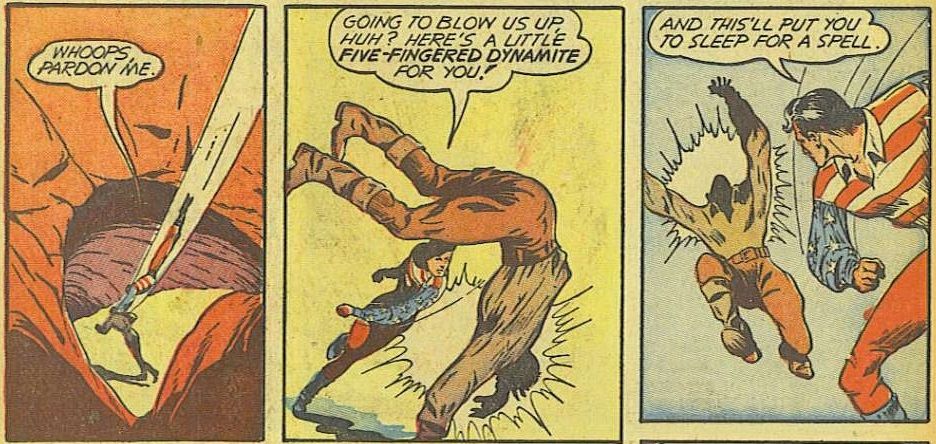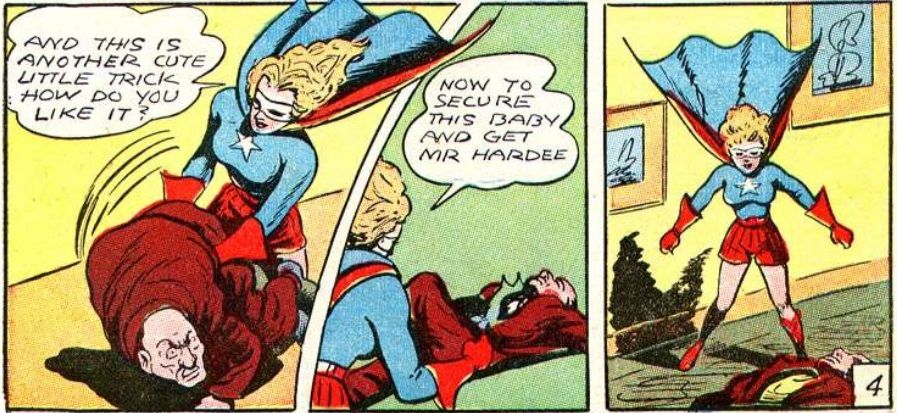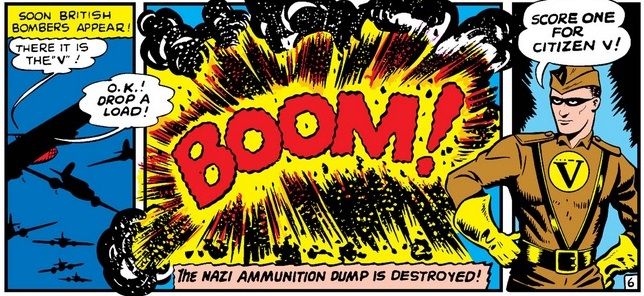Obviously, the answer is yes. But this was not a foregone conclusion.
Well before the United States entered World War II, American superheroes enthusiastically defended America from foreign threats. In fact, a whole slew of new, patriot-themed heroes were created for just that purpose. Captain America was only one among many, and he wasn’t even the first: that would be the Shield, created a year earlier.
So why did Captain America stick around so long while so many other, similar characters fell by the wayside? In part, it was luck: his publisher, Marvel, survived and continued to specialize in superhero comics where so many other publishers either turned to other genres or failed completely. But that’s not a satisfying answer, is it? After all, Cap’s whole deal is that he’s one-of-a-kind — a real American boy with extra America. Surely he has some inherent quality that allowed him to soar while his fellow flag-bearers sank?
To answer this question, I read the debut issues of five patriotic superheroes, including Captain America. Cap’s long history gave him an obvious advantage in terms of character development, but I tried to ignore everything except his debut. Hopefully, this little exercise will shed some light on Cap’s success, as well as provide insight into what was going on in the comics industry when he debuted.
The Shield
Publisher: MLJ (Archie)
Debut: Pep Comics #1 (January 1940)
Costume: Jeez, guy, I thought the whole “shield” thing was supposed to be symbolic! Why are you literally wearing a shield? It just looks silly. If I didn’t know better, I’d assume he was a Captain America parody rather than his predecessor.
Origins: Unlike later characters, the Shield’s first issue doesn’t deal much with his origins. The backstory gets scrunched into one giant paragraph in the first panel. The Shield’s real name is Joe Higgins. His dad was killed in the 1916 Black Tom explosion, when Germany blew up a munitions depot in New York Harbor. This is what inspired Higgins to fight for America.
What makes you so special?: First, the Shield was the first patriot-themed superhero. Second, he was co-created by Irv Novick, who went on to a long and storied career at DC Comics. And third, unlike later characters, the Shield wasn’t out to punch Nazis or make any real-world political statements. The only mention of the Germans is in his origin story.
Perhaps that origin was meant to hint at his true purpose, but in the main story, his opponents are “Stokian spies” — in other words, denizens of a fictional country, not Nazis from Germany. Furthermore, in the end, the Shield finds evidence that the spies were acting on their own, so there was no need for America to go to war. (Not sure that’s how spies work, but okay.) It’s like the comic wanted to make a World War II comic without actually mentioning World War II. Perhaps that was prudent, as America had not yet entered the war (in fact, war only erupted in September 1939, so it had barely started at this point), but in light of later characters’ actions, it seems a little wishy-washy.
As an aside, the Shield also isn’t too bright. Instead of securing the head spy before stopping to read some evidence, he leaves the guy free to create a massive pile of explosives right behind him and then escape out a secret passage. How long was he standing there reading that the spy had time to do this?
Minute-Man

Publisher: Fawcett
Debut: Master Comics #11 (February 1941)
Costume: Is it silly? Yes. Do I love his little pirate shirt? You know I do.
Origins: Jack Weston’s dad, like the Shield’s, was killed in World War I-related circumstances. Very unlike the Shield, however, Minute-Man anticipates a future when America enters World War II and sends the army overseas to rescue Europe. But they still avoid mentioning the Nazis by name.
Weston, at his guardian’s behest, not only joins the army but also agrees to become a modern day minuteman. The minutemen were a civilian militia group that helped America win the Revolution, so I guess the point here is that Weston, as Minute-Man, would be able to work outside the military’s rules to protect America from threats closer to home.
What makes you so special?: Besides the shirt? Not much. Weston’s debut as Minute-Man is abrupt. One second, he’s agreeing to join the military; the next, he’s whipping on his costume to stop a masked man from sabotaging his troop train. Where did he get the costume? How does he know how to fight? His costume doesn’t appear to have special protective properties like the Shield’s. We don’t even get a token line about his being a high school athletic champ or anything. It’s just vague and messy.
Captain America

Publisher: Timely (Marvel)
Debut: Captain America Comics #1 (March 1941)
Costume: Let’s face it, anyone who dresses up like a flag is going to look goofy. But at least it’s bold without straying into overtly comedic (lookin’ at you, Shield).
Origins: Spindly Steve Rogers signs up for a government experiment designed to boost his strength, speed, and intelligence. The serum is successful, but the brilliant scientist who invented it is quickly killed by a Nazi saboteur, leaving Steve to become America’s sole super soldier.
It’s the best origin story I’ve seen so far, but if you only look at Cap’s origin story, it’s presented a bit oddly. Cap himself isn’t the main focus: we actually follow the point of view of some government officials invited to watch the serum application process. Steve himself doesn’t get a single line of dialogue until after the scientist is shot. We don’t even learn his name is Steve until the second to last page! He has less personality than the Shield and Minute-Man combined!
What makes you so special?: Despite sharing some elements in common with previous patriot-heroes — an obsession with fifth columnists and spies, for instance — the difference between Cap and his predecessors is apparent right from the cover. He doesn’t face threats from an imagined or undefined country — oh, no, he’s out there slugging Hitler right in the kisser.
Also, while the other heroes in this article all appeared in anthologies, Cap got his very own magazine. While everyone else had to cram a whole story into a maximum of ten pages, Cap got three stories in addition to his origin in this same issue. This is why his origin story, despite its unusual focus and pacing, still works.
So I guess I was wrong in my introduction. Maybe Timely/Marvel’s then-bold anti-Nazi sentiment and clear devotion to turning Cap into a star did make his eventual success a foregone conclusion.
Miss Victory

Publisher: Helnit
Debut: Captain Fearless #1 (August 1941)
Costume: It’s like if Wonder Woman’s costume was inverted and toned down. And if she was wearing bathing trunks.
Origins: Miss Wayne is a new secretary for the U.S. Office of the Foreign Trade Committee. I don’t know if that’s a real thing. Anyway, when a villain named Mr. Axis tries to screw around with an impending rubber deal, Miss Victory swings to the rescue.
What makes you so special?: Um. She’s a girl? Not too many of those running around.
But seriously, Miss Victory got a grand total of five pages to make her first impression. There are so many unanswered questions about why she became a hero, how she got enough clout to get such an important position so fast, and what her first name is. It’s implied that, unlike the other patriot-heroes, she has no connection to the government or the military. Maybe these mysteries were addressed in subsequent appearances.
If nothing else, naming her opponent “Mr. Axis” shows an increasing willingness to be explicit about the enemy’s identity. I don’t know if Captain America was solely responsible for the change, but I’m sure he helped.
Citizen V

Publisher: Timely (Marvel)
Debut: Daring Mystery Comics #8 (January 1942)
Costume: It doesn’t show in the picture, but this man wears no pants whatsoever.
Origins: Lieutenant John Watkins was evacuating from Dunkirk when a Nazi plane shot him down. His fellow soldiers all thought him dead, but in reality, a Frenchman saved his life and helped him get back to England. Once home, Watkins rebranded himself as Citizen V (that’s V for victory, of course) and snuck into mainland Europe to inspire the people and engage in sabotage.
Citizen V’s final act in his inaugural adventure is to slip into Hitler’s office and pin a “V” sign on him. This begs the obvious question of why he didn’t assassinate the guy when he had a chance. He’s a soldier, and he previously arranged for a lower-level Nazi to be shot, so it’s not like he has a no-killing code.
What makes you so special?: I guess Timely/Marvel must have had some extra-special talent compared with their competitors: just like Captain America, Citizen V’s origin story is put together extremely well. I didn’t have to stop every other page wondering if I’d missed something or wade through giant paragraphs of exposition. Citizen V was created by Ben Thompson, who I don’t know much about, but kudos to him for the neat story.
In addition, Citizen V is the only confirmed non-American on the list, so that distinguishes him a bit. He also (probably due to his being British) is the only character to become a superhero after having enlisted in the army and fought the Nazis. Unfortunately, I think his nationality worked against him in terms of longevity. Let’s be honest: most superheroes are American or represent America.
But even aside from that, Citizen V had other strikes against him. The fact that he was part of an anthology rather than the star of the book certainly didn’t help. Plus, he’s just not as splashy as Captain America. Except for the booty shorts, there’s nothing particularly superheroic about his costume — or him. If you’re an American kid reading a superhero comic in 1942, who are you going to remember: the red-white-and-blue man punching Hitler in the middle of the cover, or the random dude in army drab generically posing beside a bunch of other generically posed heroes?
There are so many patriot-heroes. So many. Five does not even BEGIN to cover it. However, even with this small sampling, Captain America’s superiority is immediately obvious. For this, we can thank the genius of his creators, Joe Simon and Jack Kirby.
Out of all the patriot-heroes whose origins I read, Captain America was given the greatest chance at success, and he took it. The others may have possessed a cool look, a compelling origin, or a bold political stance, but only Captain America had all three. He also had a creator who believed in him: long after patriot-heroes went out of fashion, Kirby and Stan Lee had enough faith to revive him for a new generation in The Avengers. And that, combined with a dash of luck, is what heroes are made of.









